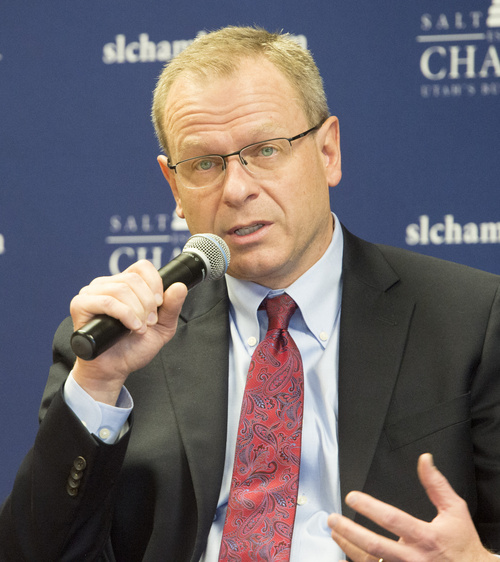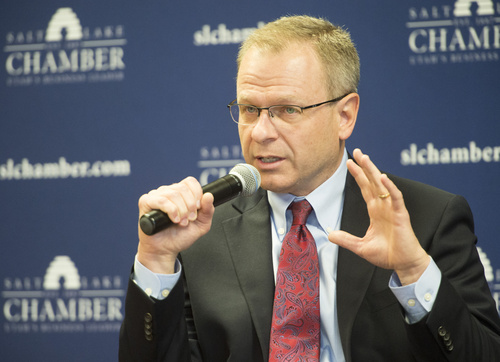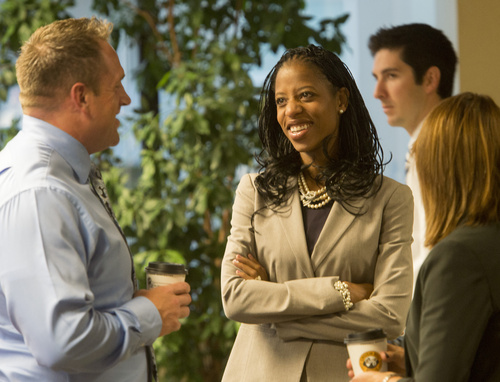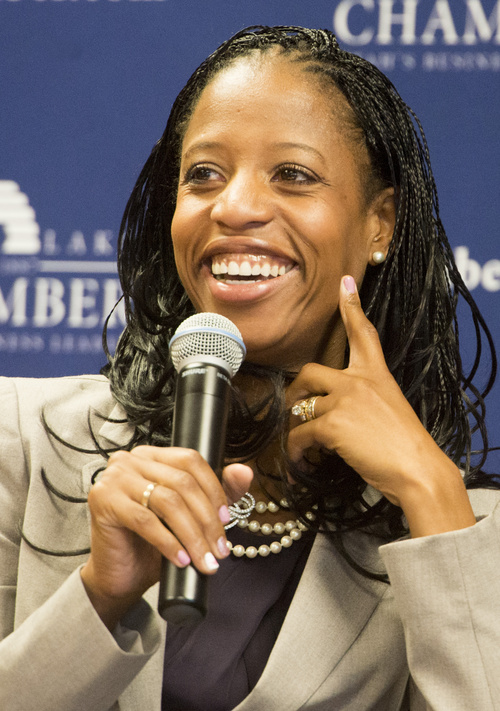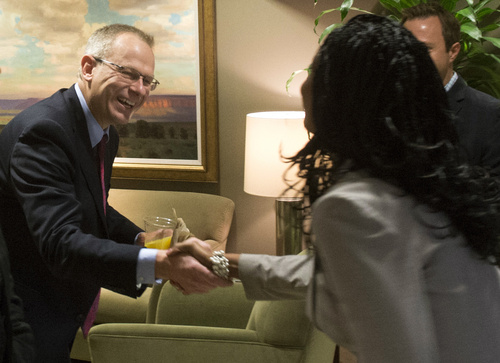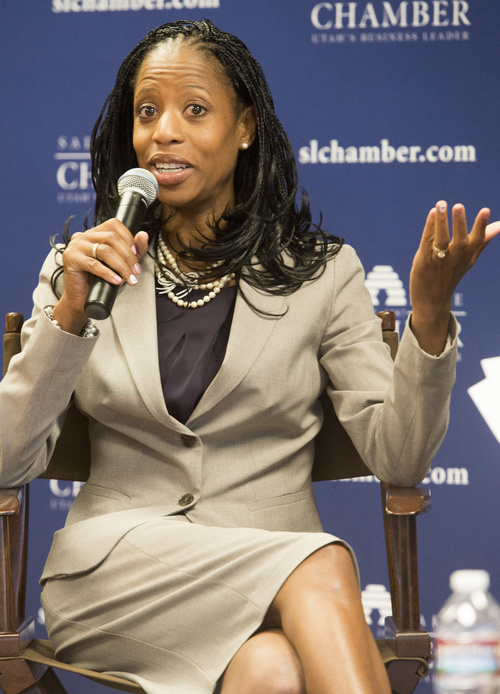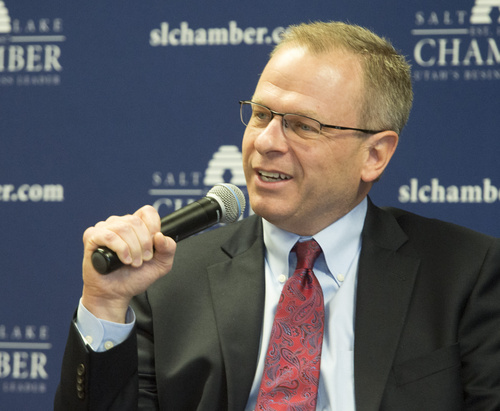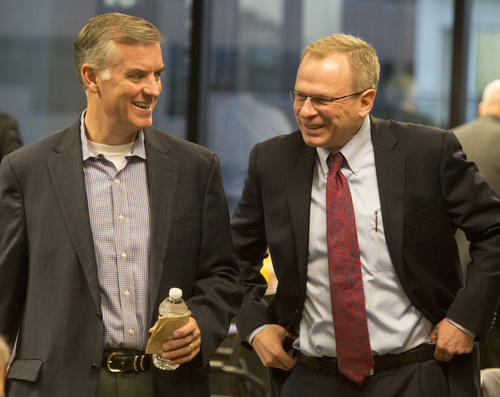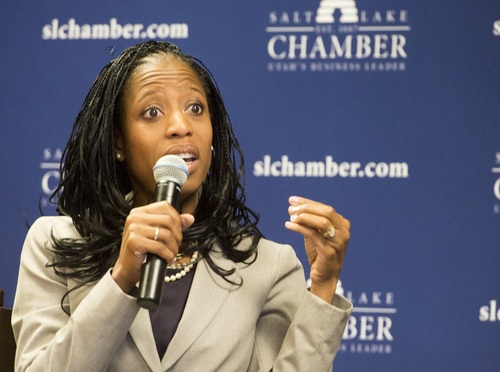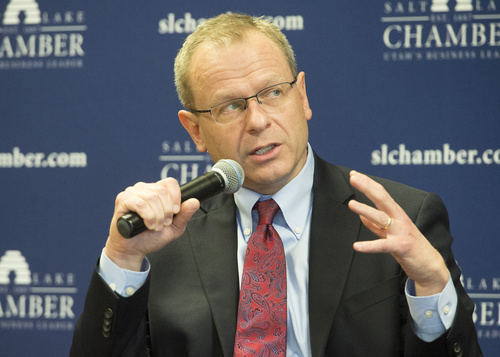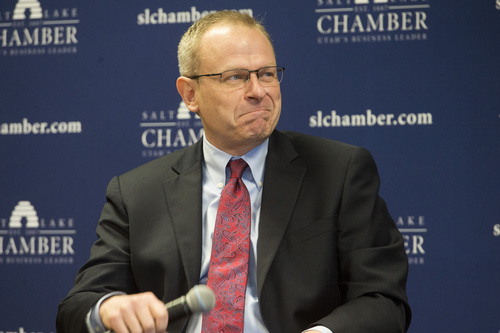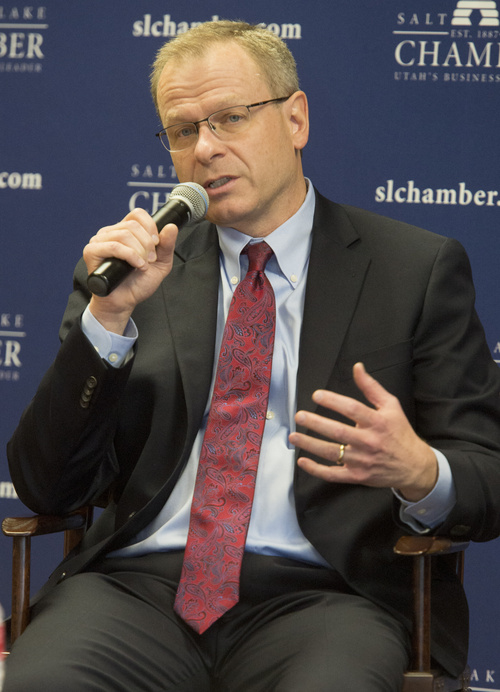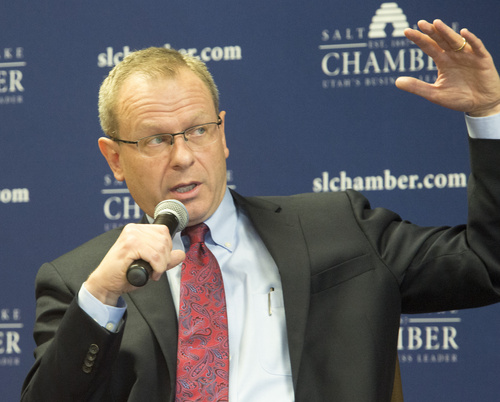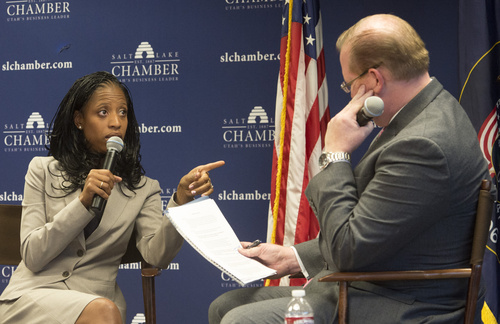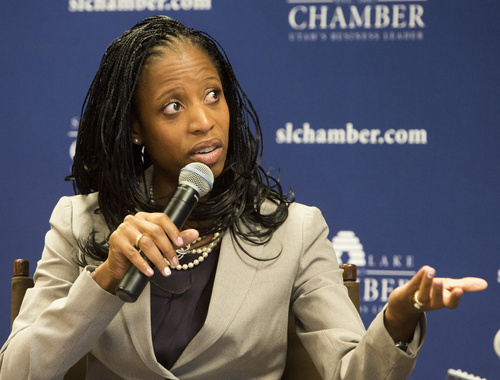This is an archived article that was published on sltrib.com in 2014, and information in the article may be outdated. It is provided only for personal research purposes and may not be reprinted.
The top candidates in Utah's 4th Congressional District tackled questions about government dysfunction, immigration reform and transportation funding in separate appearances before the state's business leaders Thursday.
The Salt Lake Chamber of Commerce planned on hosting a debate between Republican Mia Love and Democrat Doug Owens, but Love balked. She declined to participate in a joint event and asked to appear first.
Owens made light of the situation. "I would have liked to have been together with my opponent for you today, so you could have seen us side by side," he told the 40 business executives on hand. "Apparently, they seem to think we are matter and anti-matter and if we ever meet, there is going to be some kind of cosmic explosion."
The two candidates, who did shake hands at the event held in the Salt Lake Chamber's board room, have had just one joint public appearance sponsored by the Utah Taxpayers Association, where Owens sought to paint Love as an extreme partisan and she decried what she considered a personal attack.
The 4th District contest appears to be one of the closest races in the state and is the only House campaign without an incumbent.
Love, who lost to Rep. Jim Matheson, D-Utah, in 2012, is the front-runner in recent polls.
She has agreed to only one debate, a head-to-head showdown Oct. 14 in KUED's University of Utah studios that will have a small, select live audience and air live on seven television stations and be live-streamed by The Salt Lake Tribune.
Love argued that any debates should be open to voters.
"I believe a debate should be in the eye of the public, where everyone can see where we stand on the issues, instead of in small groups," she said, noting the Chamber event wasn't publicized beyond its membership, few of whom live in the 4th district. "I want to make sure we are being fair."
She counts the Taxpayers Association event as a debate and said that means she'll participate in two, which is more than is taking place in the other three House races.
Even without a face-off, Thursday's event offered an early look at areas where the two candidates have different approaches.
They both lamented that Democrats unilaterally pushed through the Affordable Care Act and they agreed that a tax on medical devices should be eliminated.
But they took different tacks on the raging debate over how, and if, Utah should expand Medicaid to poor adults not eligible for subsidized coverage through the federal-health exchange.
Owens said it is "a shame" the state didn't immediately accept the federal expansion, saying people have died waiting for health care as the state's leaders continue the debate. He said Gov. Gary Herbert's Healthy Utah plan, which would use federal money to funnel poor adults into private coverage, is "playing to the right."
"One reason to elect me and not my opponent is so we have some moderation and a counter-voice, and not have every politician in the state playing to the right," he said. "That is an unhealthy thing in our state."
Love didn't offer her personal view on expansion, but said she'd support whatever decision state leaders make. She did, however, argue the federal government should give the state the power to craft a program that best fits Utah, outside of the stringent federal regulations.
"Right now," she said, "we are trying to make a decision within a box" created by the feds.
For months, Herbert has negotiated with federal regulators on a Medicaid-expansion proposal. He expects to reach a final deal in the coming weeks.
The Chamber has identified government dysfunction as the single biggest threat to Utah's economic growth.
Love said she had the ability to push past the partisanship and cited her experience as mayor of Saratoga Springs as proof. That city has the highest bond rating available.
"You don't get that by being dysfunctional," she said "You don't get that by refusing to work with others. It's really being able to see a vision, understand how things are going to work and then really going out and getting people to come along with you."
Owens said he has the same sensibility as his late father, Rep. Wayne Owens, D-Utah, who worked across party lines to get the Central Utah Water Project into law.
And he said he has experience crafting difficult compromises through his work as a corporate defense attorney.
"My native outlook is to help people get together," he said.
The candidates agreed that the state and the transportation industry need more certainty from Congress, which has passed a series of short-term transportation funding bills. Love's position is similar to a proposal by Sen. Mike Lee, R-Utah, that would return much of the federal gas tax to states to cover road and transit projects. Love said she has not yet read Lee's plan.
Owens didn't support returning the bulk of the gas tax money to the state, saying the federal government has a prime role in building nationally significant transportation projects.
On comprehensive immigration reform, which the Chamber supports, the candidates agreed that the government should offer visas to students educated in the United States and bolster border security. Love didn't address what to do with undocumented immigrants, though she previously said she doesn't support "amnesty" and suggested that issues should only be addressed after the legal immigration system is overhauled.
Owens said he supports a pathway to citizenship for undocumented immigrants, saying it is unrealistic and inhumane to deport 11 million people. He said bringing them into legal status, after paying a penalty, would benefit the economy.


